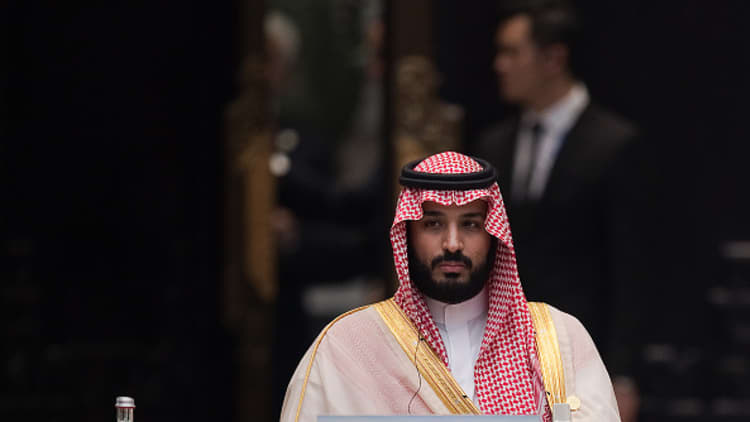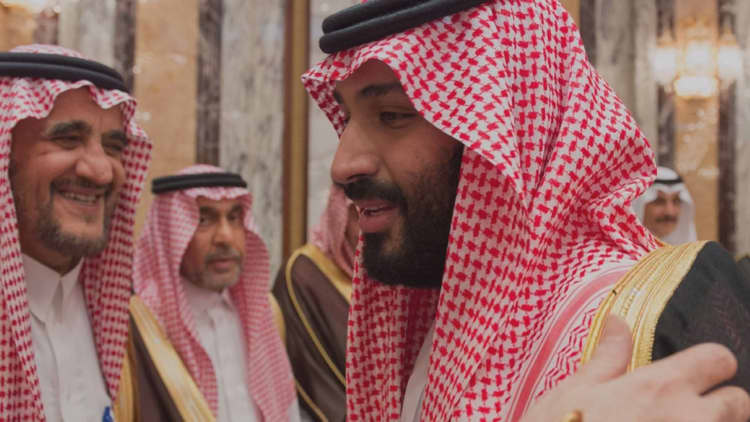Snap has held advanced talks to open an office in Saudi Arabia, positioning the social media company to be a first-mover in the country among its peers, according to sources familiar with the discussions.
In addition to potentially opening an office, the company is developing a content deal with the MiSK Foundation, a Saudi youth empowerment organization chaired by Crown Prince Mohammed bin Salman, according to one of the sources. The partnership would provide Snapchat workshops and training to Saudi youth to develop homegrown content for domestic audiences.
Snap declined to comment.
The move would make Snap one of the first Western social media companies to establish a physical presence in the kingdom. It would also provide some measure of validation for the Saudis at a time when the nation's 32-year-old crown prince is attempting an economic overhaul heavily weighted toward developing a domestic technology sector.
Snap's potential move into Saudi Arabia brings to life a choice that tech titans have long internally debated, whether to conduct business remotely or establish a physical presence in-country.Sam Blatteisfounder and CEO of The Mena Catalysts
Crown Prince Mohammed is currently on the West Coast leg of his U.S. visit, where a Saudi delegation is meeting with representatives from the film, entertainment and tech sectors. The Saudis are trying to develop these and other industries as part of Vision 2030, an ambitious plan to diversify their oil-dependent economy.
Few details about Snap's potential Saudi office were available, including which city would host it, what the head count would be and how many Western workers would staff the outpost.
A Saudi office could help Snapchat expand its foothold in the Arab world's largest economy, a place where 70 percent of the population is younger than 30 years old. The service is already tremendously popular in Saudi Arabia. Its use among the kingdom's youth featured prominently in a recent interview with Crown Prince Mohammed by the CBS program "60 Minutes" and report on the economic and social reforms underway there.
Along with Asia and Africa, Middle Eastern countries like Saudi Arabia represent the next frontier for companies like Snap as it becomes more challenging to add users in developed markets like the United States. American social media companies and internet 2.0 firms like Facebook, Google and Twitter operate out of Dubai, a more developed and less conservative business hub in the neighboring United Arab Emirates.

In addition, Snapchat could be an advertising vehicle to reach the nation's millions of young people. Though Middle East and North Africa 2017 advertiser spending decreased from previous years due to political issues and declining gas prices in the region, digital advertising budgets in the region were still projected to hit $1 billion by 2019 by Zenith.
"Snap's potential move into Saudi Arabia brings to life a choice that tech titans have long internally debated, whether to conduct business remotely or establish a physical presence in-country," said Sam Blatteis, Google's former head of government relations for Gulf countries and now CEO of The Mena Catalysts, a consultancy that advises tech multinationals on policy and governmental affairs in the Middle East.
"But with the booming Saudi high tech sector, we are hearing that the mindset may be slowly shifting from it being wiser to conduct business from afar, to conduct operations on the ground in the Kingdom, in order to participate in this fertile soil of emerging Saudi online advertising," Blatteis told CNBC in an email.
To be sure, there are still many challenges to working in Saudi Arabia, including the segregation of men and women in many workplaces and security concerns that restrict Western workers' movements. The nation's lack of a modern entertainment sector also makes it less attractive than Silicon Valley for young tech workers.

There are also strict cultural rules that govern advertising, which has caused controversy in the past. Notable controversial Saudi ads have included airbrushing women out of Ikea catalogues, the portrayal of athletic women in a Nike ad and a Coke ad where a young woman is being taught to drive by her father.
And last year, Snap said it had blocked the Snapchat Discover channel for Qatar-based news agency Al Jazeera in Saudi Arabia to comply with Saudi laws. Saudi Arabia and the UAE have spearheaded a blockade of Qatar for nearly a year, and are fiercely critical of Al Jazeera.
If the Saudi office comes to fruition, Snap would be a pioneer among its generation of tech companies in the kingdom, where some executives question whether authorities are willing to allow the conditions that would typically attract foreign talent.
Marc Raibert, founder of robotics firm Boston Dynamics, recently told a gathering of Saudi and American business leaders that a tech hub needs a certain amount of freedom to pursue projects that might feel threatening in a country like Saudi Arabia. That will lead to some measure of chaos, he said.
"Without that, I don't think the young people who work for me are going to be comfortable spending too much time there," Raibert said during a panel at last week's Saudi-U.S. CEO Forum in New York City.
Saudi oil giant Aramco and Google announced an agreement to explore building a cloud computing hub in the kingdom last week in New York City. The same day, the kingdom's sovereign wealth fund signed a deal with Japanese tech investor SoftBank to develop the world's largest solar power project.
Also during the U.S. trip, Saudi entities signed agreements to develop content with National Geographic, explore industrial financing with J.P. Morgan Chase and expand educational partnerships with MIT.
Disclosure: CNBC parent NBCUniversal is an investor in Snap.



